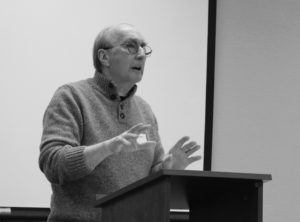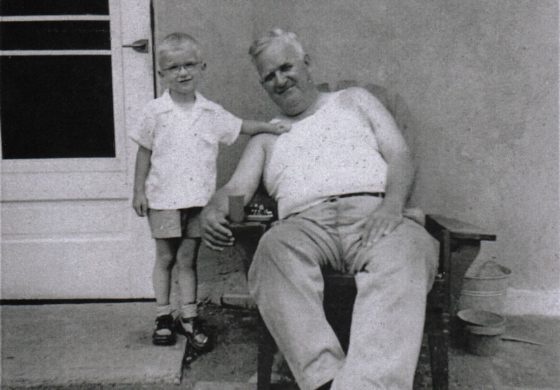BY PAGE H. GIFFORD
CORRESPONDENT
A teacher for 35 years of economics, law and accounting, Warren Groeger always wanted to write. In retirement he finally fulfilled that dream, beginning with re-searching a family member who became the centerpiece for his first novel, Kati, Cara, and KT: Chronicling a Family’s Lives.
“I did not have the good fortune to enjoy the company of all my grandparents, but I did have the presence of my maternal grandmother, Helene Louisa Frederika Barrow Brophy – all 4 feet 10 inches of her,” he told the members of the Friends of the Library. He added that his grandmother was not given to storytell-ing or reminiscing, but as his curiosity about the family developed she allowed him to examine many heirloom documents she assembled throughout her life.
The documents were a mystery to him since they had been written in an old form of German, known as fraktur. This led him to study German in high school so he could translate them. He discovered a place called Silesia, an eastern province of Imperial Germany that is now a part of Poland.
“That cache of brittle mementos, which I now have framed on my walls, formed the impetus of over 50 years of casual, occasional research into my roots,” he said. Once retired, he intensively researched his background and discovered heroes and villains, meek and mighty, quiet and loud ancestors. “I had a Dutch ancestor, who was an embezzling, war-fomenting, cradle-robbing, cheating and fascinating leader of the old New Amsterdam before it became New York.”
There was a Revolutionary War soldier and many other male ancestors, but no women stood out until he did more re-search and found Theresa Schoy. Tessie, as she was known, came to America in 1887 with her lover, Willie Rau.
She became pregnant in the 1890s and he abandoned her in Hell’s Kitchen, a poverty-stricken section of New York City. Tessie had no intentions of going quietly into the night, but rather had Rau arrested and thrown in prison for breach of marriage. She later had the baby and gave it her surname. Groeger explained that this precluded her daughter from becoming a citizen, since women at the time could only become citizens by virtue of their husbands, and Rau was naturalized.

Warren Groeger. Photo by Page Gifford
“Tessie went to live with her cousin and worked as a tenement janitor and eventually met my great-grandfather’s brother Freddie. I had my hero,” Groeger said. “She became the centerpiece of a subsequent volume of family history, someone beyond the usual recordings of mostly men.”
He then blended family history and fiction and his first novel was the result. The novel deals with the history of three generations of women: the great-great grandmother, modeled after his great Aunt Tessie, the grandmother and a young, edgy college student.
“Family history can be used for creative writing, but it can also be used to generate greater interest in one’s past, simply by recalling moments in the lives of those one knows or knew,” he said. Groeger then read a short piece that won him first place in the Blue Ridge Writers non-fiction contest for 2018, called Grandpa Brophy’s Embrace.
His story was rich and vivid in detail, capturing a time that would always remain memorable for Groeger. He brought the audience into his world to view the past, meeting his grandfather and sharing those special moments during their hikes he recalled as “timeless, enchanting expeditions.” He beguiled his listeners with the beautiful simplicity of a relationship he would always treasure. He transported the audience back in time with vignettes, including berry picking, nature lessons, an unplanned meeting with a stern-looking cow, a visit to a cider mill and a ride in an old 1938 Chevy coupe that left behind “a stifling plume of exhaust.”
“Oh, these moments I hope I retain are true. To revel in forever, as though there might be a guiding spirit within me that knows: You were your grandfather’s joy,” he read. He then came to end of the story and the end of a life. “Just as love can open one’s soul to moments of remembered joy, fear can scar one with jagged remnants of sorrow.”
He read his description of the moment when his family arrived at his grandparents’ house at dusk in 1955, a child’s bewilderment at seeing the ambulance with its “one red dome light turning slowly in the darkening evening, casting a garish, pulsing glow on the front of the home.” He added, “These are images I will always carry.”
He later learned his grandfather had died of a massive heart attack. He could not remember what he did on those days after his grandfather’s death. He did not attend the wake or the funeral. “Death had taken him quickly, had ambushed him and wrapped its strong, thick arms around his chest and embraced him,” Groeger wrote.
He ended his discussion by saying, “What is important is that your words come from the heart – that they are your personal expression, your way of memorializing your dearest family members.” He added that anyone interested in learn-ing more about writing their own family stories can join him at the Fluvanna County Library Jan. 11 from 10 a.m. to noon.





